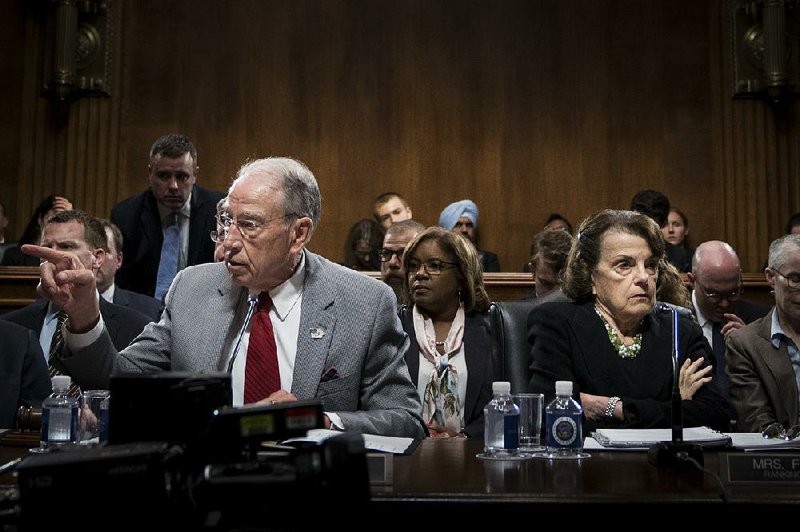WASHINGTON -- The senior Democrat on the Senate Judiciary Committee referred information involving Judge Brett Kavanaugh, President Donald Trump's nominee to the Supreme Court, to federal investigators Thursday, but the senator declined to make public what the matter involved.
Two officials familiar with the matter say the incident involved possible sexual misconduct between Kavanaugh and a woman when they were both in high school.
The statement by Sen. Dianne Feinstein of California came a week before the Judiciary Committee is to vote on his nomination. "I have received information from an individual concerning the nomination of Brett Kavanaugh to the Supreme Court," Feinstein said in a statement. "That individual strongly requested confidentiality, declined to come forward or press the matter further, and I have honored that decision. I have, however, referred the matter to federal investigative authorities."
The information came in a letter, which was first sent to the office of Rep. Anna Eshoo, D-Calif., and included the allegation of sexual misconduct toward the letter's author, a person familiar with the letter confirmed.
Feinstein, who received the letter from Eshoo's office this summer, informed fellow Democrats on the Judiciary Committee about its existence and its contents Wednesday evening. Several Democrats advised her to take its claims to the FBI.
The White House responded almost immediately.
"Throughout his confirmation process, Judge Kavanaugh has had 65 meetings with senators -- including with Sen. Feinstein -- sat through over 30 hours of testimony, addressed over 2,000 questions in a public setting and additional questions in a confidential session. Not until the eve of his confirmation has Sen. Feinstein or anyone raised the specter of new 'information' about him," said White House spokesman Kerri Kupec. She added, "Sen. Schumer promised to 'oppose Judge Kavanaugh's nomination with everything I have,' and it appears he is delivering with this eleventh hour attempt to delay his confirmation."
Aides to Sen. Charles Schumer of New York, the Democratic leader, said he has not seen the Eshoo letter, but he believes the committee is handling the matter appropriately.
Feinstein had not shared the letter with the committee's chairman, Sen. Charles Grassley, R-Iowa. Nonetheless, Grassley said the matter would not impact his timeline.
"Sen. Grassley is aware of Sen. Feinstein's referral," said George Hartmann, a spokesman for Grassley. "At this time, he has not seen the letter in question, and is respecting the request for confidentiality. There's no plan to change the committee's consideration of Judge Kavanaugh's nomination."
The move by Feinstein came after the Senate Judiciary Committee, in a series of party-line votes, rejected Democrats' efforts on Thursday to subpoena documents and testimony into Kavanaugh's years as a top White House aide under President George W. Bush.
Democrats have accused Kavanaugh of evading and misleading the committee during last week's confirmation hearings, and continuing those charges, volleyed a series of requests for more information centering on some of the most contentious issues that surfaced, including his views on executive power and his relationship with a former Republican Senate aide who stole documents from Senate Democrats.
"We have more questions than answers and the only way to address these concerns about Judge Kavanaugh's credibility before this committee is to hear from those witnesses," Sen. Richard Blumenthal, D-Conn., said.
The Democratic demands included testimony from the Senate aide, Manuel Miranda, who passed Kavanaugh documents that were illegally copied from Democratic computers. Senate Democrats grilled the judge during the hearings on whether he knew or suspected that materials he received from Miranda as staff secretary under Bush had been taken from the files of Senate Democrats without their authorization.
Committee Democrats also sought to subpoena documents related to Kavanaugh's knowledge of Bush-era enhanced interrogation and wiretapping policies. Democrats have accused Kavanaugh of playing down his role in each program; he has maintained he was not aware of the policies and learned of them only from news reports.
Republicans rejected each of those requests Thursday, and dismissed the Democrats' efforts as theatrical bids to appeal to their bases. Grassley said they will go ahead with a committee vote on Kavanaugh's nomination in the Senate on Thursday.
A Section on 09/14/2018
